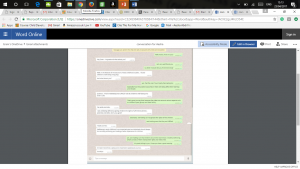Task 4:
 My learning journey throughout this module of introduction to early childhood studies has expanded my personal experience and understanding of children. It has covered various topics which made me think about what queries are raised about the subject and how it been defined by others (Giles and Middleton, 2010, p.10-11).
My learning journey throughout this module of introduction to early childhood studies has expanded my personal experience and understanding of children. It has covered various topics which made me think about what queries are raised about the subject and how it been defined by others (Giles and Middleton, 2010, p.10-11).
Wellbeing proved to be a strong point for me during this module. Previously my personal understanding of wellbeing reflected how individuals engage with the environment, this then impacts the individual’s wellbeing throughout their life-course. It seemed for children, the environment plays a big role in their wellbeing (Cooper, Burton and Cooper, 2014, p.6). Considering children are growing up and the majority are in educational institutions, where the environment is regularly attended. Studies show school settings that are decorated with pictures, displays and other images of children’s work gives a visual effect which reflects on children’s ability to, observe giving a stimulus, therefore, affecting learning, performance, and attitude (Cooper, Burton and Cooper, 2014, p.6).This was quite enlightening as it gave me ideas on how to stimulus a good learning environment for children when I myself become an early years teacher, it’s also a bonus to know it improves their overall wellbeing.
Throughout this topic about the wellbeing of children, it evolved to me how children are the people of the future. It extended my understanding as it made me realize the importance of how as a society, we should establish good habits in children during the early years of their life as for them to become a ‘basis for life-long health and well-being’ (DCST, 2007:7).
The Connection between children’s rights and their well-being also shone to the concept of wellbeing. It amazed me that the UN Convention on the rights of the child implied on strengthening the child as a citizen. This then resulting in the core analysis of the child being the child’s wellbeing. There are many key influences that impact on the child’s wellbeing, establishing a strong independent child for the future.
Concluding my understanding I gained from this topic, it enlightened me to understand that every child should have the opportunity to fulfill their abilities, skills, and potentials (Bradshaw et al., 2007:135). Giving every child the sense of being loved, health, safety and to be included in the families and society in which they are born (UNICEF 2007:4).
Reference For Task 4:
Cooper, R., Burton, E. and Cooper, C. (2014). Wellbeing, a complete reference guide. 1st ed. Chichester, West Sussex: John Wiley & Sons.
Giles, J. and Middleton, T. (2010). Studying culture. 1st ed. Oxford [u.a.]: Blackwell Publishers.
United Nations International Children’s Emergency Fund (UNICEF) (2013) Child well-being in rich countries: A comparative overview. Innocenti Report Card 11. Available online at http://www.unicef.org.uk/Images/Campaigns/FINAL_RC11-ENG-LORES-fnl2.pdf
Underdown, A. (2007) Young Children’s Health and Wellbeing, Maidenhead and New York: Open University Press.